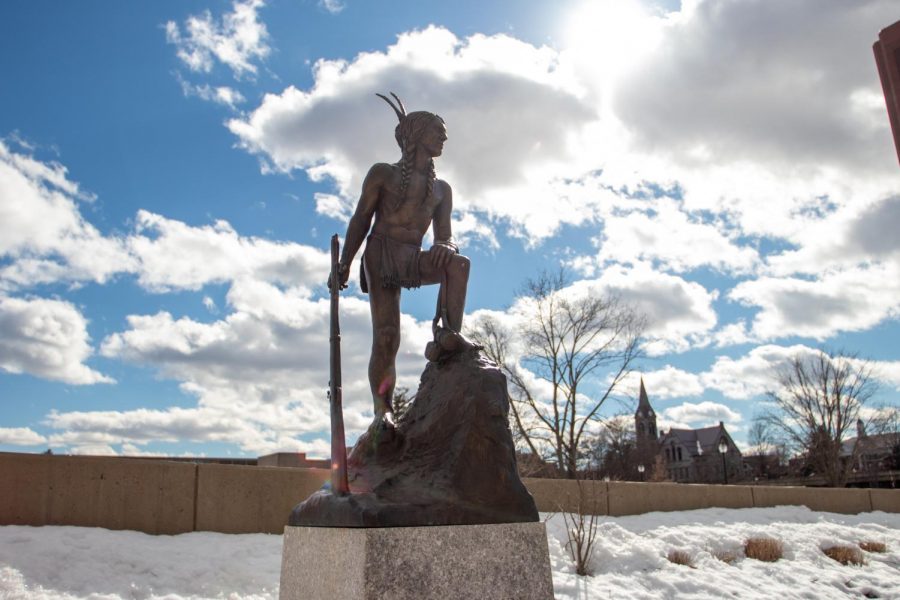The University of Massachusetts closed on Monday, Oct. 11 to recognize a Massachusetts legal holiday. On campus, classes were canceled for Columbus Day, but step foot in the town of Amherst and your long weekend commemorated Indigenous Peoples’ Day.
Like many American universities, UMass has profited from the exploitation of Indigenous peoples and failed to properly recognize and repent its history. Administrators today cannot change the past, but they’re responsible for holding the University accountable and educating the future.
The easiest, most symbolic action Massachusetts and UMass can take is to change the official name of the holiday from Columbus Day to Indigenous Peoples’ Day. Amherst was the first community in the state to do so in 2016.
“Amherst believes that the culture of Native American people is one to be promoted, the history is rich, diverse, and worthy of celebration, and that the actions and policies of European colonizers of the Americas destroyed a part of that culture, and inhibited the promulgation of it for generations to come,” reads the petition.
Christopher Columbus set sail in 1492 in search of gold and spices. He landed in the Bahamas, thinking he reached Asia, and was credited with discovering a “new world,” one already inhabited by people indigenous to the islands. Columbus never reached North America, but his crew was responsible for brutal violence, enslavement and sexual abuse in the Caribbean.
European colonialism affects every facet of modern society, but it should not be celebrated. Columbus’ journey and legacy should be taught in schools without shying away from his atrocities. His actions can be recognized and learned from without glorification. Indigenous Peoples’ Day is a more appropriate way to commemorate the history and resilience of America’s first inhabitants, and it was marked as such by President Joe Biden this year.
The second symbolic change rests on the Town of Amherst, named for Lord Jeffrey Amherst. Lord Amherst advocated for biological warfare against Indigenous peoples during Pontiac’s War in 1763 by distributing small-pox-infested blankets to opposing native tribes.
“You will do well to try to inoculate the Indians by means of blankets, as well as to try every other method that can serve to extirpate this execrable race,” wrote Lord Amherst in a letter.
Like Columbus, Lord Amherst is an important historical figure to study, not celebrate. In 2016, Amherst College removed “Lord Jeff” as its unofficial school mascot, an important step to dismantling Lord Amherst’s influence. UMass will not change its name without a change to the town, but it must make an effort to educate students about the man whose name dons their clothing and diploma.
UMass touts its “humble roots” as a land-grant research university, but it did not innocently acquire the land. Massachusetts Agricultural College was founded under the Morrill Land-Grant College Act of 1862. Under the program, states received free acres of land from the federal government and sold it to fund agricultural and mechanical colleges. The government seized the land from Indigenous peoples, often through theft and undervalued treaties.
The goal of the Morrill Act was to “serve the common good” by training farmers and mechanics at public universities, but it came at a cost to local Indigenous peoples. UMass and surrounding colleges are located on Norwottuck land. UMass students today take classes in the Morrill Science Center, named for Senator Justin Morrill, but 25 undergraduate “American Indian/Alaska Native” students were enrolled last fall, only 0.1 percent of the undergrad population. And UMass is not unique. Students around the country learn in Morrill halls, but only 19 percent of Native Americans aged 19-24 are enrolled in college. This minuscule number is more than 20 percent lower than the overall population.
Students today benefit from the prejudiced policies of UMass’ founding. The University should be responsible for ensuring no student graduates without understanding the history of the land they’re educated on. Indigenous Peoples’ Day is the perfect opportunity for UMass to acknowledge its origins and dedicate itself to a more equitable future.
Catherine Hurley can be reached at [email protected] and followed on Twitter @cath_hurley.





















Sarah • Oct 15, 2021 at 10:19 am
https://www.hcn.org/issues/52.4/indigenous-affairs-education-land-grab-universities
^ this is a great piece on land-grab universities published last year